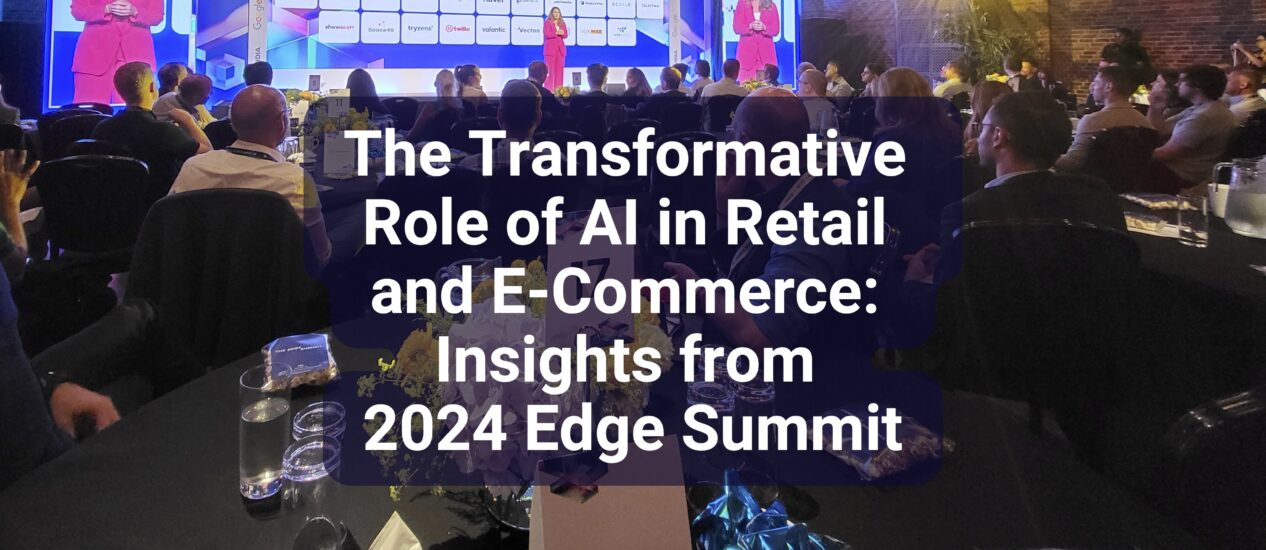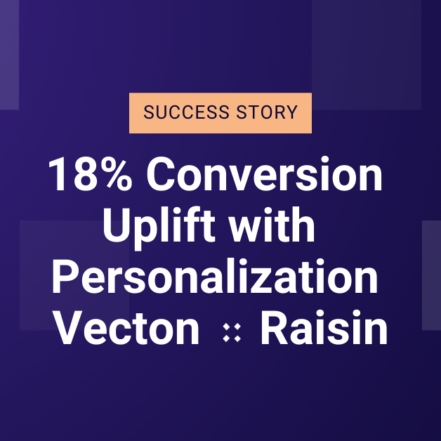Warsaw, September 10th, 2024
Last week, as Vecton we had the privilege of attending the 2024 Edge Summit in London, where thought leaders from Nvidia, Google, Bloomreach, and others gathered to discuss AI’s potential to transform commerce. As a consultancy specializing in CRM and Marketing Automation, we were particularly interested in understanding how AI will revolutionize the Retail and E-Commerce industries.
The summit painted a complex but promising picture of AI’s role in the future of retail and beyond. The consensus among speakers and attendees was that AI presents a tremendous opportunity for innovation, though it requires a cautious and deliberate approach. While there is a palpable optimism, it’s clear that this transformation will unfold over time—potentially over the next two decades—before the full impact of AI on industries like retail becomes evident.
The Current State of AI in Retail and E-Commerce
Today, the market landscape is in an experimental phase with AI. Vendors and platforms are actively exploring how to harness AI’s power to improve customer relationships, marketing strategies, and overall business efficiency. Bloomreach, for example, introduced its “Discovery +” product, showcasing a glimpse of AI’s growing role in this sector.
These innovations are just the beginning and the industry is poised for a profound shift as AI takes center stage. Google talked about the concept of “platforms for AI models” which offers an early look at what’s to come. These platforms, connected to vast data repositories, are designed to empower different AI models to drive personalized customer experiences at a level of granularity that’s difficult to imagine today.
As the industry evolves, AI will play an increasingly prominent role in shaping customer interactions. The expectation is that customer experiences will soon be so deeply personalized that they will anticipate needs and desires in ways that current CRM systems cannot yet match. This personalization will extend far beyond marketing, touching supply chains and internal operations, as well.
AI’s Immediate Impact: The Supply Chain and AI Agents
One of the most impactful short-term applications of AI in retail, according to Nvidia, lies in optimizing the supply chain. AI-driven predictive models, powered by data science, are expected to enhance everything from inventory management to demand forecasting, streamlining operations and improving customer satisfaction. For companies invested in CRM and Marketing Automation, these innovations could mean more seamless integration between marketing efforts and product availability, leading to better customer experiences.
Another emerging trend discussed at the summit is the rise of AI Agents in the workplace. These agents, drawing from vast datasets including organizational history, customer information, and marketing materials, are designed to operate alongside human teams, offering real-time insights and recommendations. While these agents are still in their early stages of development, their potential to serve as co-pilots or even co-managers within an organization is vast. However, this also raises significant challenges in structuring the human-machine relationship within the workplace, where the balance of control and decision-making authority must be carefully managed.
Caution Amid Optimism: The Challenges Ahead
Despite the overall optimism, the Edge Summit speakers were clear that AI comes with risks—some of which could have significant consequences for the industry. Among the most discussed challenges were issues like deepfakes, fake news, and false impersonation, all of which could erode consumer trust. In the realm of CRM, AI’s “hallucinations,” or its tendency to generate inaccurate or misleading information, remain a key limitation that businesses must navigate cautiously.
Building trust in AI will require more than just technical advances. It will likely involve collaboration between private companies and governments to create ethical standards and regulatory frameworks that address these risks. As AI models improve and costs decrease, some challenges—like AI hallucinations—may diminish, but others will require systemic solutions.
Conclusion
The 2024 Edge Summit highlighted that while AI has immense potential to revolutionize Commerce, its path is challenging. The next few years will see businesses navigating this experimental phase, with early adopters setting the stage for what could become the norm in AI-driven customer management.
For organizations like Vecton, the key takeaway is clear: embracing AI’s transformative potential requires both innovation and caution. As we move forward, the role of AI in Retail and E-Commerce will only expand, offering new opportunities for personalization, efficiency, and engagement—while also demanding new approaches to governance and risk management. The future is exciting, but it’s one we must shape responsibly.






























